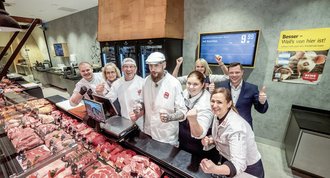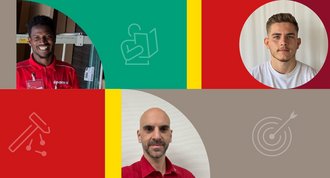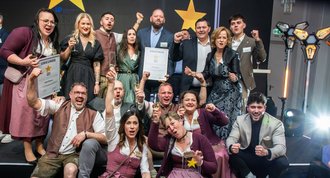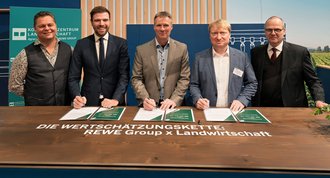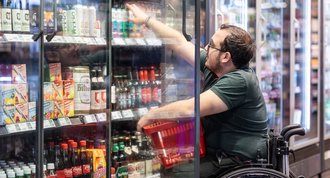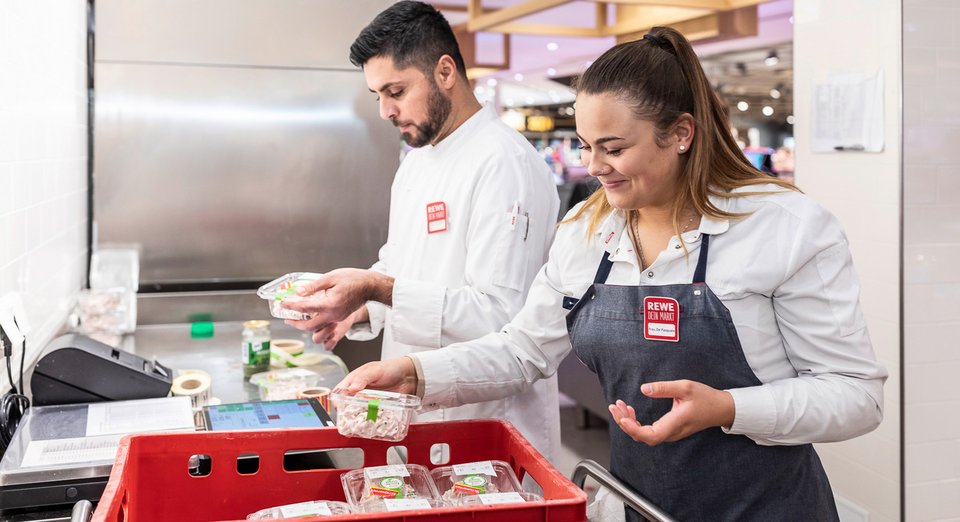
How do you get young people excited about the butcher's trade in the store? Beate Lindmark and Annina Muhl, responsible for this topic at REWE West, have unconventional ideas. And success. We spoke to the two of them and asked "their" trainees.
The job description of butchers has a hard time. The cliché of the rough butcher's trade in a bloody apron persists. At a time when meat-free eating and the trend towards vegan diets are becoming increasingly important, the attractiveness of the profession continues to decline. Two people who want to show that the job description looks very different are Beate Lindmark, HR Training Officer, and Annina Muhl, HR Employer Branding Officer. Together, the two develop and realise unconventional ideas at REWE West to attract young people to the fresh food counter at REWE and support them during their training.
In this interview, Beate Lindmark and Annina Muhl tell us why their trainees can do acquisition as well as liverwurst, why homemade mettwurst also attracts university dropouts behind the counter and how they want to crack the demographic nut.
one: Mrs Lindmark, hand on heart: is the bloody apron in the butcher's trade really just a cliché?
Beate Lindmark: As is usually the case with clichés, there is some truth to it! Of course, butchery also involves cutting up meat. But the profession has so much more to offer - in terms of production, but also in all aspects of meat. Our advert in the careers portal on rewe.de sums it up quite well: "From ordering, preparing and finishing to selling our meat and sausage products. You will not only make your customers happy with fresh food, but also with your recipe tips."
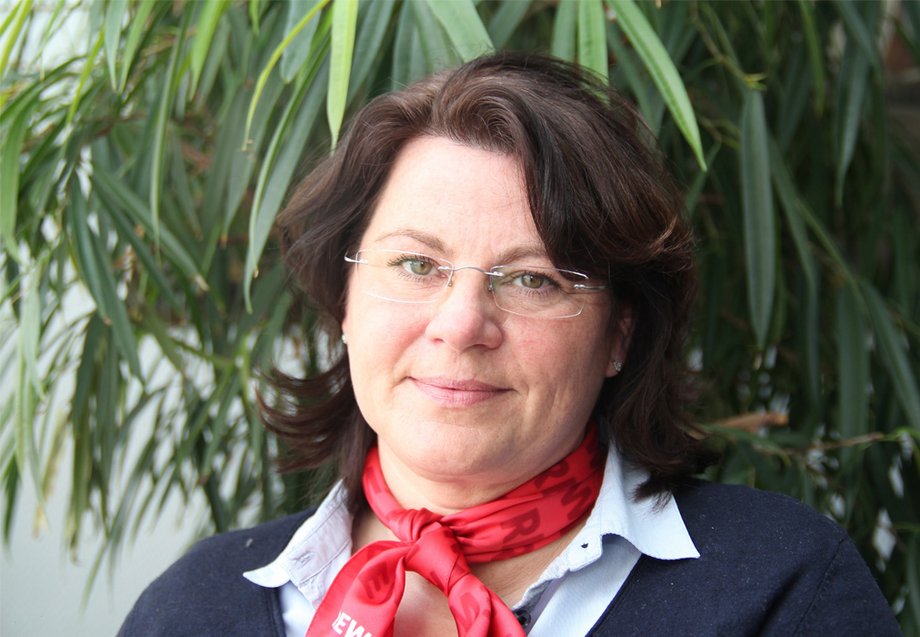 Beate Lindmark
Beate Lindmark
one: Your favourite recipe for getting young people interested in the butcher's trade in the market is not the advertisements on the website. It's the personal commitment of "your" trainees themselves. What is behind this?
Annina Muhl: Our trainees and the young, trained specialists are the best mouthpiece to help other young people find their way. They can talk authentically about their profession and the strong support they receive from us. They can also answer specific questions and show the remarkable career paths that are possible and that they are pursuing.
Because you also want to know: What happens after the apprenticeship? What happens next for me? And it certainly does: starting with the apprenticeship certificate and the master craftsman school, through further training at the REWE Academy to department management.
Beate Lindmark: Our trainees are simply the best proof that the butcher's trade can be young, modern and colourful.
„The image of the rustic butcher and the shop assistant is a thing of the past“

one: The butcher's trade is young, modern and colourful - what do you mean by that?
Beate Lindmark: Firstly, the activities: Developing new, unconventional recipes for sausage products, creating imaginative platters, buying meat from regional sources, focussing on animal welfare, providing customers with targeted advice - there are so many ways to make your day-to-day work varied.
And the colleagues themselves: the image of the rustic butcher and sales assistant is a thing of the past. This is proven by our young generation of junior staff. We have an incredible number of great young people working for us who have the same wishes and dreams as trainees from other professions: security and self-realisation.
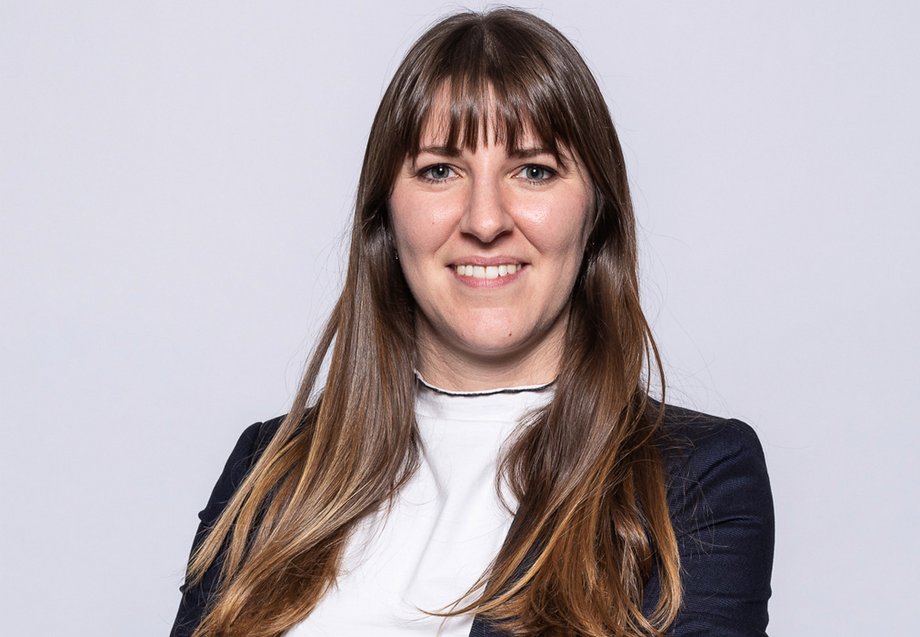 Annina Muhl
one: Back to acquisition by the trainees themselves: What do you mean by this?
Annina Muhl
one: Back to acquisition by the trainees themselves: What do you mean by this?
Annina Muhl : We use classic storytelling to acquire trainees. This means that we accompany our trainees during their training and in the years afterwards through cross-media campaigns in which the trainees provide insights into their working world. Here, they answer questions from students, provide guidance for choosing a career and show possible career paths. Personal contact is also particularly important to us: Every year, our trainees and junior staff accompany us to careers fairs to provide first-hand impressions. We also use the annual trainee projects at the fresh food counter for recruitment purposes.
one: At the end of 2022, you carried out such a project at the REWE Centre in Bonn-Beuel. The service trainees made and sold their own products there over several days. How did that work?
Beate Lindmark: Once a year, the service trainees in the West region produce and sell food at the fresh food counter for a good cause as part of a project. These are ready-to-cook products such as delicatessen salads, homemade variations of cheese creams as well as sausage and meat products.
The trainees are in their second and third year of training and work on almost everything themselves. After preparatory workshops, they get started. Three sub-teams are formed: Team Marketing, Team Action and Team Organisation. In total, there are always 30 to 40 trainees working on these issues: Which social project do we want to support with our proceeds? What do we want to produce? How do we organise ourselves? How can we draw attention to our products, the campaign and our profession? The trainees develop posters, advertising flyers and their own insert in the weekly newspaper. A project title is considered. A REWE store is selected that has its own production facilities and is easily accessible for the trainees by train and bus.
This year, the REWE West trainees have named their project "Handwerk für das Mundwerk" (Craft for the mouth) and produced typical products such as black pudding, liver sausage, brawn and meat sausage. The products are offered for tasting and sold by the trainees at their own stand in the REWE supermarket.
one: How was the campaign received?
Beate Lindmark: The customers were very impressed and gave our trainees lots of good feedback - about their delicious, home-made products and their commitment. That simply does these young people good.
After all, it was also about a good cause, which was also very well received: The proceeds of the campaign were donated to the Tafel food bank in Bonn in the form of a donation of goods from Wilhelm Brandenburg.
At the same time, the campaign was used to draw attention to a career at the fresh food counter. At a campaign stand, the junior staff actively approached customers to arouse interest in their profession.
one: Organising such projects is certainly time-consuming. Does it pay off for REWE West?
Beate Lindmark: It takes a lot of effort, but the gain in self-confidence for our trainees is worth every effort. In addition to such projects, our trainees also receive a high level of support during the year. For example, we have five training centres in the region where freelance master butchers work with our trainees to train or consolidate specific skills for the exam. For three days, a maximum of five trainees are prepared for exam-relevant tasks, such as cutting sides of beef and garnishing platters to a high standard.
The results of our support are impressive: Every year since 2013, our service trainees have been among the best young talents in Germany in the Meat Star Talent competition. This year there was another award: our butcher apprentice Pascal Jung from the REWE supermarket in Hachenburg beat off all the competition to win the "Meat Star Talent 2023".
Annina Muhl: Yes, the effort is definitely worth it. in 2013, there were six trainees at the fresh food counter. Since then, the number has grown steadily and around 50 young people now work there in the West region. We are also pleased to see the development of the traditional trade into a young and modern profession. After all, the trainees of today will be the senior managers of tomorrow and will pass on this modern culture.
„The school-leaving qualification doesn't necessarily play the biggest role for us. What matters most is how strong your self-motivation is and what makes you tick as a person“

one: Why is it currently so urgent to find new recruits for the fresh food counter professions?
Beate Lindmark : Many of our skilled workers are about to retire. You can't simply replace them. It's a demanding training programme and a challenging trade, which incidentally poses a risk to third parties in the context of food production. You need reliable, well-trained people who are highly committed to the job.
Annina Muhl: Yes, it's primarily a demographic problem. The number of future employees is falling, but the number of skilled workers needed is rising. This is not a problem specific to REWE - many companies are struggling with this.
one: What are the requirements for getting such a training position at REWE West?
Beate Lindmark: The most important thing for us is that you are motivated. You don't have to have top school grades, but good social skills and the ability to work in a team. If we realise during the interview that the applicants are keen to learn, that's more than half the battle. And if they then prove to be practically minded, thrive on the job and the customers like them, then they are valuable employees!
Incidentally, we also receive applications from university dropouts who are drawn to more practical work after a rather theoretical day of learning.
Annina Muhl: At trade fairs in particular, I really notice how problematic the topic of "leaving school" is for many young people. I often sense unease and uncertainty among secondary school students. Our answer is that this doesn't necessarily play the biggest role for us. Above all, it depends on how self-motivated you are and what makes you tick as a person. A school-leaving certificate is not a prerequisite for promotion. Our career model is based on personal motivation. This is not really known out there in the world. Our trainees and junior staff then pass this on very well through the various projects and marketing measures as well as at trade fairs.
Beate Lindmark: It's great to see how our trainees develop and realise what they can do with each year. This development phase in the 3-year training period is very important for a young person and their self-esteem.
That's what the trainees say:
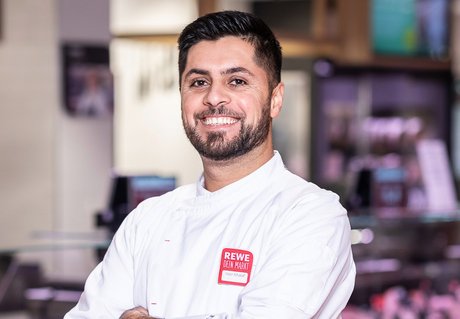 Riyadh Khalaf
What did you like best about the "Craft for the Mouth" project?
Riyadh Khalaf
What did you like best about the "Craft for the Mouth" project?
Riyadh Khalaf, 3rd year apprentice: "I learnt a lot about animal welfare and the value of meat. I liked talking directly to the customers and showing them what we made ourselves."
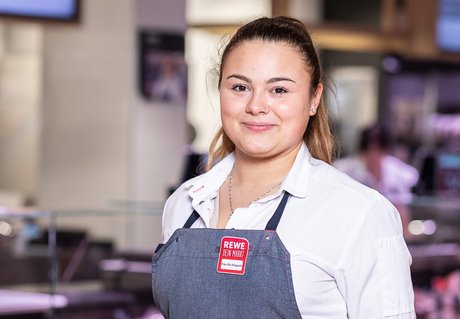 Lucy DePasquale
Lucy De Pasquale: 3rd-year apprentice: "The fact that you can talk to customers and explain to them what it's all about. It gave me more confidence to approach customers and talk to them. I also learnt how much revenue you can generate with a small production."
Lucy DePasquale
Lucy De Pasquale: 3rd-year apprentice: "The fact that you can talk to customers and explain to them what it's all about. It gave me more confidence to approach customers and talk to them. I also learnt how much revenue you can generate with a small production."
What do you take back to your market from this project?
Riyadh Khalaf: "For example, suggesting that offer a sample of items that are not so popular. And also that it's worth considering new ways of recruiting trainees."

